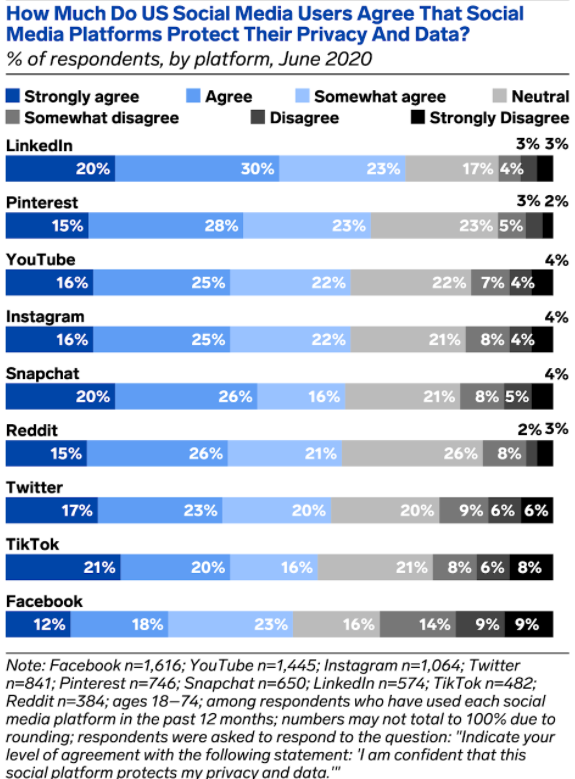Is Facebook as Distrusted as You Think? Maybe Not

With the ongoing saga surrounding Apple’s update to require ATT prompts in iOS versions 14.5 and newer, the question of how likely users are to provide Facebook with permission to track has been an ongoing debate. Since app advertisers need users to not only allow tracking for the app advertised but also to allow Facebook to track in order for the IDFA to be passed, Facebook’s opt-in rate is critical to determining what share of traffic might still be tracked via the IDFA.
This question has become even more important over the last two weeks, as adoption of iOS 14.6 has soared, pushing the ATT prompt to more users. Some analysts will point to Facebook’s spotted record regarding Cambridge Analytica and the public reaction to it to say that Facebook’s opt-in rate might be very low. But is Facebook really as distrusted as some might think?
One study cited by pessimists to point to distrust in Facebook making it unlikely to inspire opt-in is this one conducted by Insider Intelligence, which asked platform users how much they agreed with the statement ‘I am confident that this social platform protects my privacy and data.’ Facebook received the worst responses of any of the major social platforms studied.

However, zooming in on the actual percentage of users who strongly disagreed that Facebook protects data and privacy, the share was only 9%. Further, when looking at the share of users that at least slightly agreed that Facebook protects data and privacy, 53% responded as such.
Taken together with the 16% of respondents that were neutral towards the platform’s protection in these areas, nearly 70% of users surveyed didn’t clearly distrust Facebook’s handling of their data.
But of course, Facebook owns another major social media platform in Instagram, which scored even better.
Instagram has become a key cog in Facebook’s ad revenue machine, and in Q1 2021 accounted for 23% of US Facebook spend for Tinuiti advertisers, as featured in our Q1 2021 Facebook Ads Benchmark Report. Thus, opt-in for Instagram is also a key component of determining the impact of ATT for advertisers.
Looking at the same Insider Intelligence study, only 4% of Instagram users strongly disagreed that the platform protects data and privacy, and only 16% disagreed at all. The share of respondents that at least slightly agreed that Instagram protected data was good enough for it to take fourth out of the nine platforms studied in total share of respondents that agreed, and enforces the notion that the perception of Instagram hasn’t suffered from Facebook’s bad publicity as much as the core Facebook platform.
In the world of digital marketing, where practitioners and privacy experts are keenly aware of the stories surrounding how data is used and the ensuing controversy on particular platforms, it’s become a common refrain to disregard Facebook’s standing with users as irreparably tainted by scandal.
But even looking at studies that have been used to back up such claims, like the Insider Intelligence survey, it’s clear that plenty of users are fine with Facebook, or at least don’t disagree with the notion that it protects their data and privacy to some extent. This is also clearly true of Instagram, which seems to be far enough removed from the Facebook name to be pretty highly regarded by many of its users in this area relative to other platforms.
It’s still unclear what opt-in rates will look like for the social media giant and its platforms, and Facebook will likely never publish such metrics. What share of the 90%+ of users who don’t strongly disagree with the notion that Facebook and Instagram protect data and privacy might allow tracking? Even for users who might completely trust Facebook (or any app for that matter), they might question why the app needs access to such data in determining whether or not to give consent.
Obviously, outsiders can only speculate, but I’d posit that the speculation to date has erred towards the side of doom and gloom, when the reality of the Insider Intelligence study is that many users’ views of Facebook and Instagram aren’t nearly as dour as the narrative would suggest. Facebook might not be a lock to receive opt-in from users, but it’s also hard to argue that it’s so poorly regarded that it should be assumed that opt-in will be abysmal relative to other platforms.
